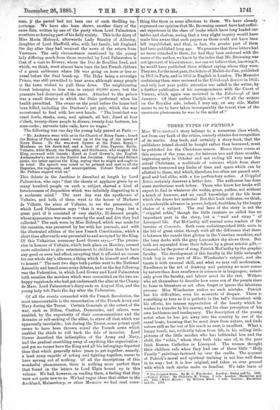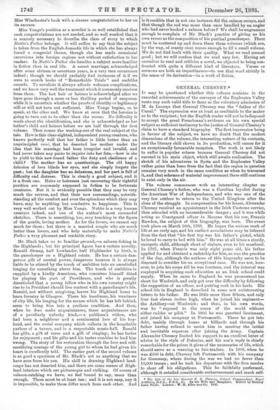THREE TYPES OF FICTION.*
MISS WINCHESTER'S story belongs to a numerous class which, not from any fault of the critics, scarcely obtains due recognition of its merits. Any book, and certainly a story-book, that the publishers intend should be bought rather than borrowed, must be published for the Christmas season. Hence there comes at this season of the year, say, for between two and three months, beginning early in October and not ending till very near the actual Christmas, a multitude of volumes which from sheer numbers transcend any limits of time and space which can be allotted to them, and which, therefore, too often are passed over, good and bad alike, with a too perfunctory notice. A Crippled Robin certainly deserves a better fate. The authoress has done some meritorious work before. Those who know her books will expect to find in whatever she writes, grace, pathos, not without a touch of humour, and no small knowledge of the life from which she draws her material. But this book indicates, we think, a considerable advance in power, helped, doubtless, by the happy choice of a subject. The real hero of the story is not the "crippled robin," though the little creature so called has an important part in the story, but a "waif and stray " of Liverpool life. Pat McCarthy will remind some readers of the heroine of Consuelo. Both seem undistinguished little units in the life of great cities, though with all the difference that there is between the canals that glisten in the Venetian sunshine, and the busy docks with the gray Lancashire sky above them. But both are separated from their fellows by a great artistic gift,— Consnelo by the power of song, Patrick McCarthy by the graphic faculty. The development of this faculty in the little untaught Irish boy is one part of Miss Winchester's subject, and she treats it with unusual skill, and what we may call moderatioa. Excellence in the art of drawing and painting no more comes by nature than does excellence in science or in languages ; nature only gives the faculty, and labour must do the rest. Writers who set themselves to describe how some son of the people rises to fame in literature or art often forget or ignore the laborious process. Miss Winchester makes no such mistake. Patrick has his difficulties, even his moments of despair. There is something as true as it is pathetic in the lad's discontent with his efforts, his intense appreciation of the beady which he wishes to transfer to his canvas, and his clear perception of his own feebleness and inadequacy. The description of the young artist when he has got away into the country by one of the canal boats, knowing that he must draw from nature, and finds nature still as far out of his reach as ever, is excellent. What a happy touch, too, evidently taken from life, in his selling little pictures of the little maiden who has befriended him and the child, the "robin," whom they both take care of, to the poor Irish Roman Catholics in Liverpool. The women thought their children safe when they had one of these little "Holy Family" paintings fastened up over the cradle. The account of Patrick's moral and spiritual training is not less well done in its way; but it is less original, and takes us over ground with which such stories make us familiar. We take leave of • The Criopted Robin. By M. 0. Winchester. London : Seeley and Co. 1888. —Nuttie's Eather. By Charlotte N. Tango. 2 vols. London: Macmillan and Co. 1885.—White Heather. By William Black. 3 vols. London : Macmillan and Co. 1883.
Miss Winchester's book with a sincere congratulation to her on its success.
Miss Yonge's position as a novelist is so well established that such congratulations are not needed, and so well marked that it is scarcely necessary to describe the class of story to which Nuttie's Father belongs. It will suffice to say that the subject is taken from the English domestic life in which she has always found a congenial theme, though she has made occasional excursions into foreign regions not without satisfaction to her readers. In Nuttie's Father she handles a subject more familiar in fiction than in real life. A secret marriage, acknowledged after some sixteen or seventeen years, is a very rare occurrence indeed ; though we should probably find instances of it if we were to search books of "Remarkable Trials" and suchlike records. To novelists it always affords welcome complications, and we know very well the treatment which it commonly receives from them. The lost heir or heiress is acknowledged after we have gone through a more or less thrilling period of suspense, while it is uncertain whether the proofs of identity or legitimacy will or will not turn out sufficient Miss Yonge begins, so to speak, at the other end. We know at once that the heroine is going to turn out to be other than she seems. No difficulty is made about the identification, and she is acknowledged as her father's child and heiress before we are half through the first volume. _Then comes the working-out of the real subject of the tale. How is this clear-sighted, independent young creature, who knows perfectly well that her father is little better than an unprincipled roue, that he deserted her mother under the idea that his marriage had been irregular and invalid, and had never taken any pains to inquire into her fate,—how is she to yield to this new-found father the duty and obedience of a child? The mother has no questionings. The old happy delusion of love blinds her eyes, and she simply forgets the past ; but the daughter has no delusions, and her part is full of difficulty and distress. This is clearly a good subject., and it is a fresh one. Heirs or heiresses just recovering their rightful position are commonly supposed in fiction to be fortunate creatures. But it is evidently possible that they may be very much the reverse, and that their new surroundings, notwith- standing all the comfort and even the splendour which they may have, may be anything but conducive to happiness. This is very well worked out by Miss Yonge. Nuttie is a very human creature indeed, and one of the author's most successful sketches. There is something, too, very touching in the figure of the gentle, loving mother. As for the lovers, we cannot say much for them ; but there is a married couple who are much better than lovers, and who help materially to make Nattie's Father a very pleasant and readable story.
Mr. Black takes us to familiar ground,—a salmon-fishing in the Highlands ; but his principal figure has a certain novelty. Ronald Strang, half Lowlander, half Highlander by birth, is the gamekeeper on a Highland estate. He has a certain dan- gerous gift of mental power, dangerous because it is always liable to be stirred by the touch of ambition into an unsatisfied longing for something above him. The touch of ambition is supplied by a kindly American, who conceives himself fitted for playing the part of Providence, and who is greatly dissatisfied that a young fellow who in his own country might rise to be President should live content with a gamekeeper's life. Ronald, not without misgiving, leaves his Highland home to learn forestry in Glasgow. There his loneliness, his weariness of city life, his longing for the scenes which he has left behind, seem to bring him into a perilous condition. And then, when he does make acquaintances, these acquaintances are of a peculiarly unlucky kind,— a publican's widow, who had been a neighbour and a sentimental love of his boy- hood, and the social company which collects in the hospitable parlour of a tavern, and in a respectable music-hall. Ronald has gifts, a gift of verse and a gift of singing ; he has tastes for enjoyment ; and his gifts and his tastes combine to lead him wrong. The story of his restoration through the love and self- sacrificing courage of the young girl to whom he had given his heart is excellently told. The earlier part of the second volume is as good a specimen of Mr. Black's art as anything that we have peen from his pen. His skill in drawing Highland land- scape-has not deserted him, and there are some scenes of High. land interiors which are picturesque and striking. Of scenes of salmon-catching we have, we feel bound to say, more than enough. There must be at least ten; and it is not easy, nay it is impossible, to make them differ much from each other. And
is it credible that in not one instance did the salmon escape, and that though the rod was more than once handled by an angler who had never hooked a salmon before? We shall be ungracious enough to complain of Mr. Black's practice of giving us his own verses as the composition of his poetical gamekeeper. There must be scattered up and down these three volumes (which are, by the way, of scanty size) verses enough to fill a small volume. We do not find fault with their quality. What we read seemed good ; but we will confess that we read very few. Having set ourselves to read and criticise a novel, we objected to being con- fronted with quite a different kind of literature. Verses or sermons are both an impertinence—to use that word strictly in the sense of its derivation—in a work of fiction.



































 Previous page
Previous page